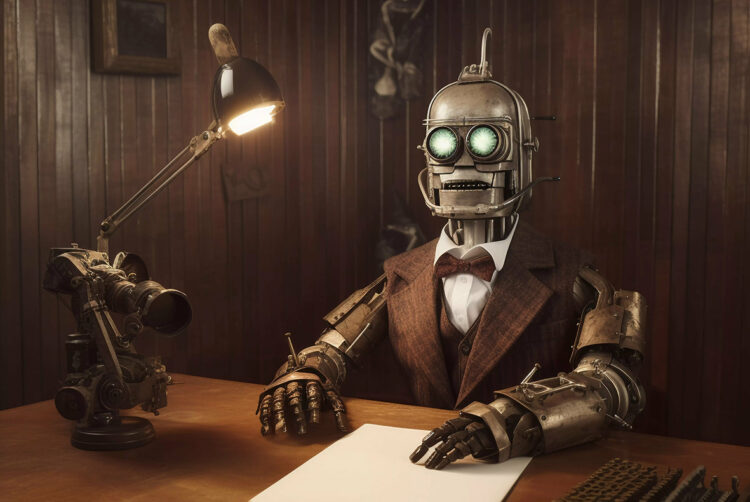5 reasons why WPP’s next CEO should be AI

Opinion
If the job of running an agency holding company has become performative, constrained and algorithmic, why pretend it requires a human?
“You saw a side of Mark that day that you don’t normally see.”
That’s what more than one person told me after I interviewed WPP CEO Mark Read on stage at The Media Leader Awards two years ago. You can still watch the video.
The consensus was that he came across as considered, insightful… even funny. Which, let’s be honest, isn’t something advertising holding company CEOs are typically known for.
What the video doesn’t show is the context: the interview took place the day before a WPP earnings announcement. Like many during Read’s tenure, it was being closely watched for signs of client churn and missed growth targets.
You’d forgive him for seeing a live Q&A as a distraction — especially given he wasn’t there to talk about WPP at all. He’d agreed to appear solely to honour the late Jeremy Bullmore, who was receiving a posthumous lifetime achievement award.
In all the digital rubbernecking and armchair punditry that’s followed Read’s decision to step down last week, one thing’s been consistent: people who know him agree that we’re talking about a thoroughly decent, trusted and competent operator.
But is being decent, trusted and competent still required?
The impossible job?
Of course, decency doesn’t make you untouchable.
The decision to “interview” Elon Musk in Cannes last year — a man who has destroyed not one but two of the world’s most recognisable brands of recent times — was badly judged.
I criticised Read at the time for not seizing the moment to challenge a bully who told our industry to “go fuck itself”. But “optics” were often a challenge for Read, whose “turnaround narrative” failed to convince analysts.
Where his didactic predecessor Sir Martin Sorrell once thrived on pitting WPP agencies against each other to drive competition, Read pursued “simplification” — most recently hollowing out GroupM into a generic WPP Media blob.
Still, this is the impossible job he signed up for.
And maybe the truth is: no one person can fix WPP.
The holding company model is a machine designed to optimise margin, not value. Increasingly, the people running it aren’t leading.
They’re performing the role of “leader” in an unwinnable game.
Step aside, mortal
So why keep playing?
If AI is coming for the middle layer of every professional service industry — from writers to consultants to strategists — why not apply the same logic at the top?
I’ve seen this first hand since launching my own business. As a freelance writer and consultant, I have to repeatedly explain why what I do can’t be replaced by a well-prompted chatbot.
People assume that if ChatGPT can write a halfway decent blog post, it can also ghostwrite a column, develop a brand voice or build a content strategy.
And maybe it can… if what you wanted was mediocrity.
So if we’re honest about how leadership functions in a structure like WPP — how performative, constrained and reactive it has become — then why not hand the job to a machine?
It might not be worse. In fact, it might be better. Here’s why.
News, analysis, comment and community — Join The Media Leader
1. AI has no ego — perfect for a job with no real power
WPP’s CEO doesn’t lead so much as orbit a fragile constellation of brands, client demands, investor expectations and HR crises. Every quarter brings more talk of “transformation”. Every memo contains the phrase “platform first”.
It’s not leadership. It’s choreography.
An AI wouldn’t fight the structure. It would accept it.
It wouldn’t pretend to be a visionary. It would just generate strategy decks.
And it definitely wouldn’t ask for £5m a year.
2. AI doesn’t get embarrassed when the stock doesn’t move
When Read’s departure was announced, WPP’s stock price barely budged.
I had to wade through The Wall Street Journal’s C-suite page just to find its news story about it.
That says everything. Not about him, but about how little faith the market has in anyone turning things around.
WPP’s share price fell more than 50% during Read’s tenure. Publicis Groupe, by contrast, is up over 80%. That’s not a gap. That’s a rout.
And the market’s reaction to Read’s news? Indifference.
An AI wouldn’t take it personally. It wouldn’t worry about legacy. It would just keep optimising the spreadsheet.
3. AI might finally figure out how these companies make money
Most analysts (as well as a growing number of employees) don’t fully understand how holding companies generate profit. Media margin? Time-based billing? Cost-centre alchemy?
The model is now so convoluted that even insiders struggle to articulate it clearly.
Give a chatbot like Claude access to 30 years of internal reports and contracts, and maybe it could reverse-engineer a revenue model that makes sense.
That would be progress. Assuming some enterprising executive hasn’t done this already…
4. AI can handle complexity without demanding more budget
Today’s clients want more. More channels. More briefs. More personalisation. They don’t want to pay more.
The consultant Michael Farmer calls this the “all-you-can-eat buffet” — clients expecting limitless output at fixed cost, while agencies stretch themselves thinner each quarter.
And then the poor humans burn out. Teams collapse. People are forced out or quit.
But an AI CEO wouldn’t panic.
It would absorb the complexity, run the numbers and present a roadmap to operational hell with bullet-pointed clarity.
5. AI won’t pretend to be Publicis
WPP’s version of “transformation” never matched Publicis’s execution.
While Arthur Sadoun picked a direction — “Power of One” — and built the infrastructure to deliver it, WPP stuck with brand mergers, logo refreshes and internal reorganisations that confuse more than they clarify.
Publicis grew. WPP shrank. The market took notice.
An AI wouldn’t talk up synergy.
It would compare the delta, run a regression and state the obvious: the model isn’t working.
And, unlike a human CEO, it wouldn’t get defensive about it on stage.
Rethinking the system
So should WPP really appoint an AI CEO?
Of course not. That would be absurd. (You’re a wise reader of The Media Leader, so you knew that already… didn’t you?)
But so is pretending another well-meaning executive can reverse decades of structural decay, client devaluation and economic opacity through charm and another transformation roadmap.
Maybe it’s time to stop romanticising leadership at companies like WPP. Maybe our time is better spent by rethinking the system that grinds even the best people into placeholders.
Until then, an AI CEO doesn’t sound like such a joke to me.
It sounds like the logical conclusion of a business model that already treats people like machines.
 Omar Oakes was founding editor of The Media Leader and continues to write a column as a freelance journalist and communications consultant for advertising and media companies. He has reported on advertising and media for 10 years and was previously media and tech editor of Campaign. His column on The Media Leader was nominated for the BSME’s B2B Column of the Year in 2024.
Omar Oakes was founding editor of The Media Leader and continues to write a column as a freelance journalist and communications consultant for advertising and media companies. He has reported on advertising and media for 10 years and was previously media and tech editor of Campaign. His column on The Media Leader was nominated for the BSME’s B2B Column of the Year in 2024.




